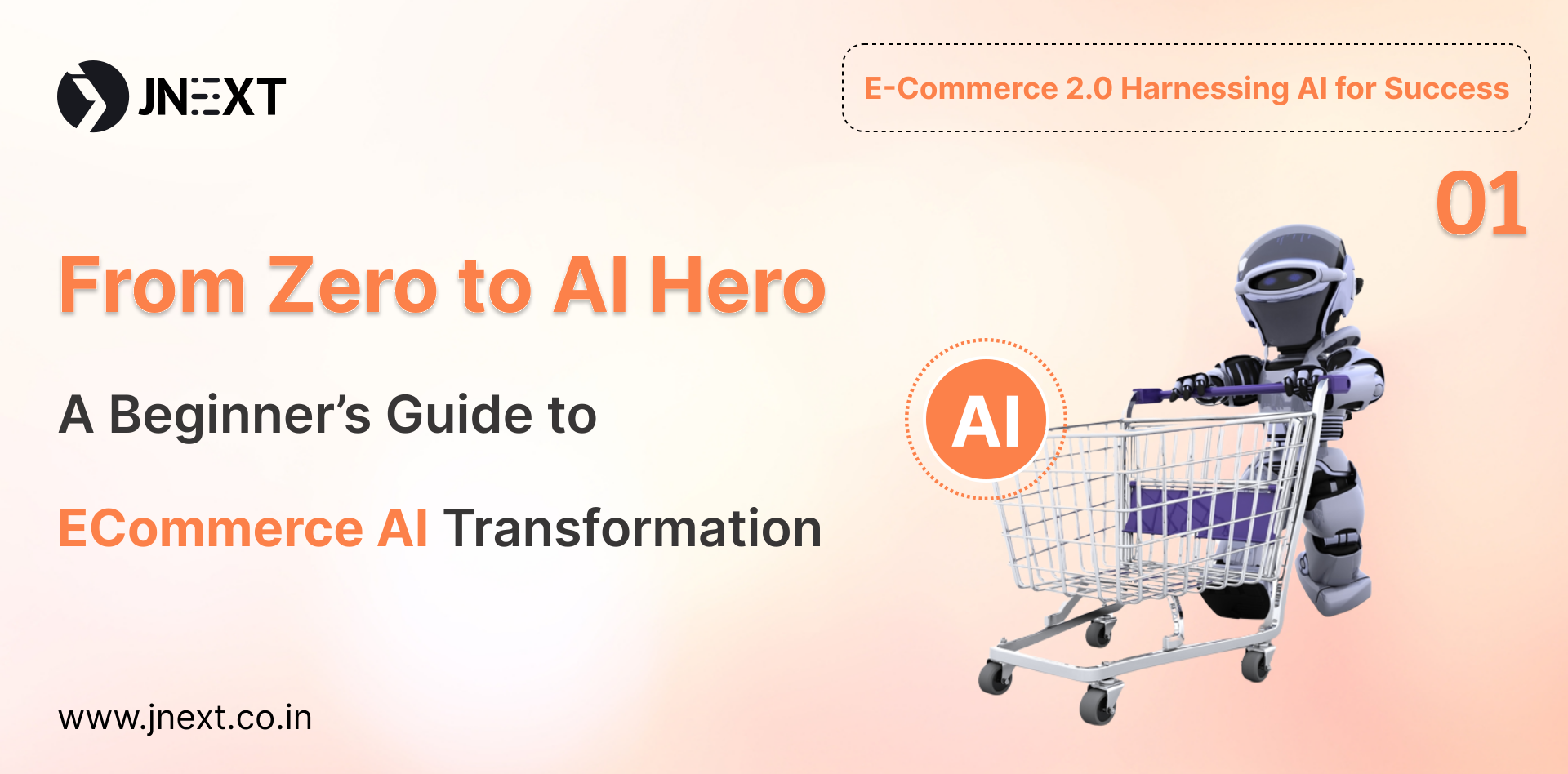How AI Transforms E-Commerce: A Step-by-Step Guide From Zero to AI Hero
A Beginner’s Guide to eCommerce AI Transformation
Jane got to an article regarding artificial intelligence in eCommerce one day after enduring yet another demanding week of juggling everything. She chose to investigate how AI in online shopping could benefit her firm since she was intrigued by the possibilities. She had no idea that this choice would turn her online store from a failing business into a booming online marketplace.
Jane’s tale is not the only one. Many eCommerce companies face identical problems in today’s fast-paced digital world. Customers’ requests for tailored client services and management of stocks are adequate, but they are unable to keep up.
What if you could conquer these odds and even convert them to your good? The answer is artificial intelligence (AI). AI has transformed online shopping to make it more focused on customers and profitable. This guide will walk you through the process of incorporating cutting-edge technologies and conveying how AI can fundamentally alter your eCommerce business.
In this guide, you will learn:
The fundamental concepts and importance of AI in online shopping
How AI enhances personalization, customer service, inventory management, and more
Common challenges and how to overcome them
The benefits of AI, including enhanced customer experience and operational efficiency
Steps to implement AI in your online store
Future trends in AI and their impact on eCommerce
Ready to become an AI hero like Jane? Let’s dive in.
Understanding AI in Online Shopping
Envision managing a busy eCommerce business with a magical helper who can anticipate trends, comprehend consumer preferences, and handle inventory with ease.
How fantastic would that be? No…
Artificial Intelligence (AI) is all about this. Artificial Intelligence is nothing more than technology, particularly computer systems, simulating human thought processes. Learning, Thinking, and Self-Correction are some of these processes.
AI was just a notion in the beginning rather than a useful technology. However, as technology developed, AI started to permeate a number of sectors, including eCommerce.
AI was only an academic endeavor in the 1950s. It developed into useful applications like Data Mining by the 1990s.
Basic AI Functionalities in Online Retail
Here we have listed out some of the very outstanding yet exceptional functionalities of AI that too with examples included for better understanding
01
Personalization
Meet Sarah, a seasoned internet buyer. She enjoys finding new things, however, she dislikes the experience of having to go through numerous listings or posts (presumably on a website or platform) in order to find what she is looking for.
As she moves into personalized AI. Sarah’s purchasing history, surfing habits, and even the amount of time she spends on each product page are all analyzed by AI algorithms. The system uses this information to suggest products easily that Sarah is probably going to like.
In this way, AI has resolved Sarah’s issues.
Retail giants like Amazon and Netflix use this technology to boost user engagement and satisfaction.
02
Customer Service
The next functionality that we are discussing here seems very important aspects i.e. Customer Service.
Assume that at 2:00 in the morning, a client named Mark wants assistance with a recent order. Rather than having to wait for office hours, Mark speaks with a helpful Chatbot that helps him right away. In this way AI is minimizing human intervention to an extent yet assisting.
Intelligent artificial intelligence (AI) Chatbots and Virtual Assistants are constantly available to provide timely support and efficiently manage issues.
Organizations such as H&M improve customer experience by using AI chatbots to manage order monitoring and product searches.
03
Inventory Management
Imagine that your business always has an abundance of popular & indemand good and never runs out of them. This can be a more daunting task manually but is made feasible by AI, which optimizes supply levels and predicts demand.
For instance, Amazon uses artificial intelligence (AI) to manage its enormous inventory and make sure the in demand products are available when they’re needed. This lowers storage expenses while simultaneously increasing consumer pleasure.
04
Visual Search
The way consumers locate things is being transformed by visual search, quite popular too nowadays.
Imagine being able to quickly locate comparable products online after spotting a chic jacket on Instagram. How can this be done?? Users can upload pictures and find matching products in the store with the help of AI-powered visual search.
Retailers like ASOS use visual search to make shopping more intuitive and engaging.
05
Voice Commerce
Just think about how easy it would be to use your smart speaker to place an order for groceries while preparing your dinner. Yes, that’s possible. Customers can use voice commands to make online purchases, all thanks to AI-powered voice commerce.
Voice commerce, which offers a hands-free buying experience, is growing in popularity thanks to gadgets like Google Home and the Amazon Echo.
06
Fraud Detection
Visualize a situation in which a fraud is prevented from affecting you without the need for human intervention. How can this be done?? Through the analysis of transaction patterns and the identification of abnormalities, AI can detect and even prevent fraud.
Businesses that protect their platforms with AI, such as PayPal and Stripe, guarantee safe transactions for their customers.
Let’s hop on some benefits that AI is offering, so that you have a clear understanding.
Benefits of AI in Online Shopping
AI has numerous benefits, but we’ve tried our level best to list out some of the best benefits of AI with examples
Enhanced Customer Experience
Imagine entering a store where the employees are familiar with your tastes, recall your previous purchases, and can make instantaneous recommendations for products you will adore.
That is the eCommerce magic that AI offers.
AI-driven customization can boost consumer happiness by up to 20%, says an Accenture study. This happiness is largely influenced by personalized product recommendations, which make shopping easier and more pleasurable.
For example, Netflix’s AI algorithms recommend movies and TV shows based on your previous viewing routines making the platform extremely entertaining and simple to use.
Research by Epsilon also indicates that 80% of consumers are more likely to purchase from brands that offer personalized experiences.
Operational Efficiency
AI retail can operate your store like a well-oiled machine by automating tedious chores and streamlining procedures. Think of it as your constant helper. Time and Money might be saved significantly as a result of this Efficiency.
According to McKinsey & Company, artificial intelligence (AI) can boost operational efficiency in eCommerce operations by automating up to 30% of processes. This covers order processing, customer support, and inventory management.
Data-Driven Decisions
Imagine possessing a crystal ball that enables you to make incredibly accurate business decisions. AI is that crystal ball for you. AI online retail enables you to make well-informed decisions that fuel growth by converting massive volumes of data into meaningful insights.
Businesses who use AI for data analytics report a 15% boost in decision-making accuracy and speed, according to Gartner.
Starbucks, for instance, utilizes AI to identify the best sites for its stores based on the demographics and purchase patterns of its customers.
Competitive Advantage
Consider AI as your covert tool in the fiercely competitive eCommerce market. You may differentiate yourself from the competition by providing better client experiences and operational efficiencies by utilizing AI.
AI gives companies the ability to innovate and quickly adjust to shifting market conditions.
Businesses that protect their platforms with AI, such as PayPal and Stripe, guarantee safe transactions for their customers.
For instance, Alibaba leverages AI to improve customer service and logistics so that it may continue to lead the global eCommerce market.
What, after this?? You might be thinking about the implementation.
Implementing AI in Your Online Shopping Store
In order to join the AI vibe in your eCommerce you need to be clear about the implementation steps—
Define Your Objectives
Start by identifying specific areas in your eCommerce store where AI can solve problems or seize opportunities for you. Be clear with your objectives and plan to proceed with.
Select the Right AI Tools
After that, patiently choose AI technologies like Machine Learning, Natural Language Processing, or Computer Vision that best fit your identified goals. Find relevant solutions as well as Tools that might be of help for you.
In my opinion, Small and inexpensive solutions, such as basic recommendation engines or chatbots for customer care, can have a big impact on SMEs without breaking the bank.
More advanced AI applications, however, can be advantageous for large-scale businesses. Think about sophisticated predictive analytics tools that can adjust pricing, forecast demand, and target advertising efforts.
Gather and Prepare Data
Don’t miss this step. Do collect relevant data from your eCommerce activities and ensure it’s clean and well-organized for accurate AI training.
Train Your AI Model
The AI model is all about experience and learning. You need to make your system learn more to be more accurate.
Use machine learning algorithms to teach your AI model by feeding it with the prepared data. This step is crucial for the AI to learn patterns and make predictions.
Integrate AI into Operations
Implement the trained AI model into your eCommerce systems. This may involve developing custom software or using existing AI solutions.
I suggest- For small and medium-sized businesses, this can mean adding an AI chatbot to your current customer support software or putting up an AI-powered recommendation engine on your website.
Larger companies may find the process more cumbersome. AI integration with many systems, such as supply chain management and CRM, may be required. At this point, extensive testing is required to ensure that everything works as expected and produces the anticipated outcomes.
Gartner predicts that by 2025, 75% of businesses will have shifted from pilot AI projects to operational AI implementations.
Monitor and Improve
Continuously monitor how well your AI in online shopping solution performs. Adjust and optimize the AI model as needed to maintain its effectiveness and relevance to your business goals.
By following these steps, you can effectively harness AI’s capabilities to streamline operations, enhance customer experiences, and drive business growth in eCommerce.
Don’t Miss the Common Challenges
Every journey has its challenges, and implementing AI in online shopping websites is no different. Let’s explore some common obstacles and how to overcome them
Technical Challenges
Limited IT resources or a lack of internal experience might be technical issues for small and medium-sized enterprises. To assist in bridging these gaps, think about collaborating with AI suppliers who provide thorough assistance and training.
A survey by MIT Sloan Management Review found that 70% of companies struggle with AI retail implementation due to technical challenges.
Cost and ROI Concerns
For SMEs, cost is a major problem. Start with AI in online shopping solutions that can be applied quickly and clearly. Scalable price structures are a feature of many AI solutions, so you may start small and grow as your results show promise.
The initial investment can be high for larger businesses. But frequently, the long-term advantages outweigh the disadvantages. Setting acceptable ROI expectations and doing a thorough cost-benefit analysis will help to justify the investment decision.
Based on reduced costs and increased productivity, PwC projects that AI could contribute up to $15.7 trillion to global economic growth by 2030.
Data Privacy Issues
Data Privacy is a major concern for corporations and SMEs alike. It is vital for Businesses to make sure that their AI systems comply with appropriate privacy laws such as the GDPR or the CCPA. Consider retail merchants for AI that emphasize data protection and offer transparent privacy policies.
84% of customers care about data privacy and want more control over how their data is used, according to a Cisco research.
Future Trends in AI and eCommerce
With AI serving as your partner, your eCommerce business seems to have a bright future filled with more effective operations, delighted clients, and profitable margins.
What do you think about this? Good. Avoid having second thoughts about its future. That is really intelligent.
Integrating AI within your online shopping store would be a game-changer step for you, no matter whether you’re a small business or a retail giant. AI benefits you out with improved customer experiences, outstanding operational efficiencies, top notch data-driven decisions, and a competitive edge. The road to success with AI is all smooth. You need to be very careful with your planning and proactive strategies and let the AI pave the way for long-term success.
AI in online shopping is evolving rapidly
- AI would come up with Hyper-Personalization that would tailor websites, marketing, as well as the product recommendations in the sense of individual customer preferences. Resulting in enhancing the overall shopping experience.
- Advancements in AI-powered Image Search feature would let customers find as well as shop similar products just by uploading pictures. This would definitely help in boosting sales and user engagement.
- Voice Assistants like Alexa and Google Assistant, in the future would enhance their Voice Recognition Accuracy with AI intervention. This would result in voice commerce more intuitive as well as seamless.
- Demand Forecasting and Predictive Analytics, would definitely help businesses optimize their inventory, reduce waste, as well as ensure product availability too.
- In the coming future, AI-powered Bots would take care of the complex queries and provide personalized customer support with all ease. This all would therefore enhance satisfaction and reduce human reliance.
As AI retail becomes more accessible, SMEs will adopt AI technologies, leveling their competitive field and enabling growth. Businesses can effectively integrate artificial intelligence (AI) into retail by keeping up with the newest breakthroughs and technical improvements and by transforming themselves for growth and development.
Finally…
The future of AI in online shopping is full of exciting innovations and ever evolving consumer expectations. By embracing AI and staying ahead of trends, businesses can open new doors for growth, and stay competitive in the digital marketplace.
Think of AI as your strategic partner and explore the vast. From personalized shopping experiences to efficient operations, let AI be your assistant in your eCommerce success.
Don’t miss out on this revolution. Get Set Go & Start integrating AI within your retail strategy today to transform your online business. Stay updated & connected with us for more detailed guides on how to leverage AI for your eCommerce needs.


 July 10, 2024
July 10, 2024




TEAM id
jnext_services
email us [email protected]
india
+91 98587 63596
United Kingdom
+ 44 77679 57915